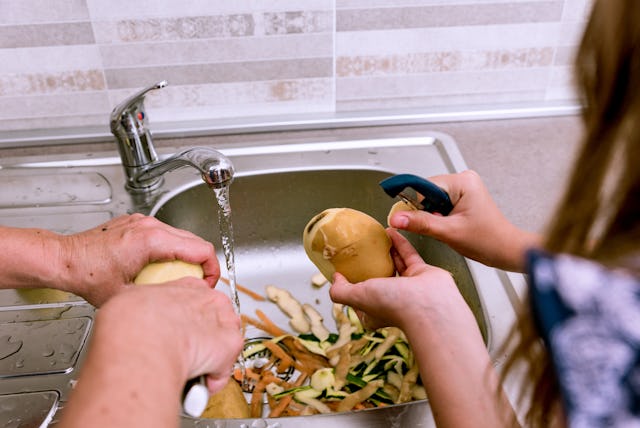Can I Put *All* Food Waste In My Garbage Disposal, Or Should I Be Trashing Some?
A master plumber breaks it down for us.

A garbage disposal seems like a magical appliance. You stick the food in the unit, hit a switch, and the food magically disappears down the drain. You can dispose of your food without taking a trip to the curb to trash it... or so you thought. While you might assume your garbage disposal can blend or shred anything, that's not exactly true. A recent uptick in reels on social media proclaims that putting everything down the garbage disposal is a big no-no, but why is that?
"While garbage disposals are designed to handle certain food scraps, it's important to understand that not all types of food can be safely processed by them," Karel Williams, a master plumber at Emergency Plumbing Squad, tells Scary Mommy. "This is primarily because some food items can cause clogs, jams, or damage to the disposal unit. Consequently, it's crucial to differentiate between what can be safely put in the disposal and what should be thrown in the garbage."
Sigh. You know what that means, right? While garbage disposals are definitely useful, it's important to remember that they are not garbage cans. If you use them as such, that could lead to costly plumbing repairs.
To help you avoid a hefty bill in the near future, keep reading to find out which foods can safely go in the garbage disposal and which ones you should trash.
Which Foods to Trash
One of the main reasons you cannot put all types of food in the garbage disposal, says Williams, is that certain items can create stubborn clogs in your plumbing system.
"For instance, fibrous or stringy vegetables like celery, corn husks, and asparagus can wrap around the disposal's blades, leading to jams and potentially damaging the motor," he explains. "Similarly, starchy foods such as pasta, rice, and potato peels can swell when mixed with water, creating a gummy paste that obstructs your pipes."
Another factor to consider is that some food items can damage the garbage disposal itself. "Hard materials like bones, fruit pits, and shells from shellfish can cause the blades to become dull or even break," he says. "Furthermore, grease, oil, and fat solidify when cooled, leading to blockages in your pipes and negatively affecting the disposal unit's performance."
Coffee grounds are another hard pass since they can accumulate and cause clogs in drains and pipes.
In light of these concerns, Williams says it's best to dispose of the items mentioned above in the garbage or the compost rather than relying on your garbage disposal.
And although it might be obvious to point out, avoid putting hazardous materials down the drain. It can not only damage or corrode the garbage disposal and plumbing system, but it's also illegal.
Which Foods You Can Toss In
When it comes to using your garbage disposal properly, Williams says you want to reserve it for softer food scraps, such as fruit and vegetable peels, small amounts of leftover cooked food, and eggshells. Doing so will "minimize the risk of clogs, jams, or damage to your disposal unit and prolong its lifespan," he says.
Other tips to help it run smoothly include cutting large food items into smaller pieces and grinding the food while running cold water. It's also a good idea to occasionally run a handful of ice cubes through the garbage disposal to help scour and clean the garbage disposal and plumbing walls. Lastly, placing orange or lemon rinds in the disposal occasionally will also help clean it, leaving a nice, refreshing scent.
This article was originally published on